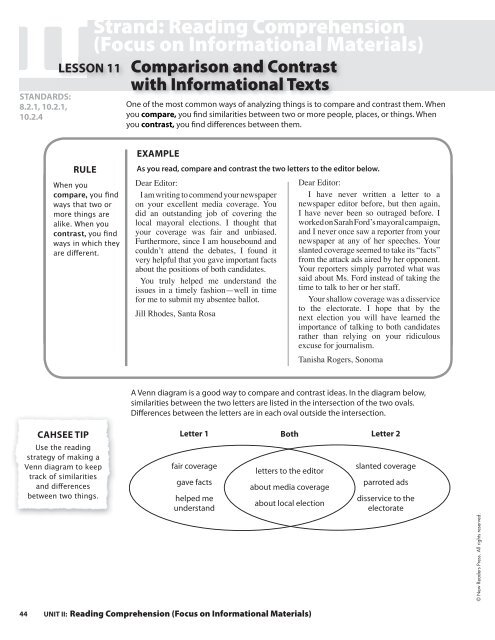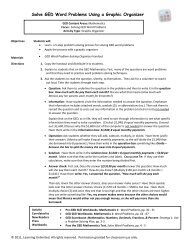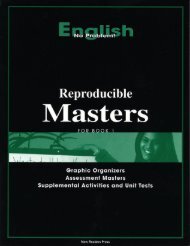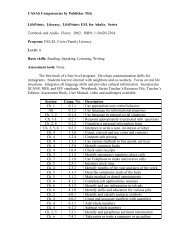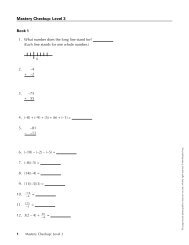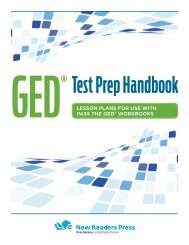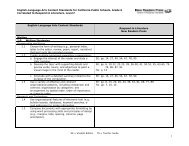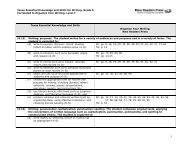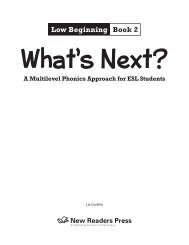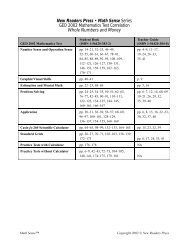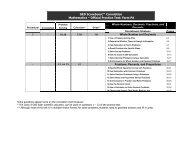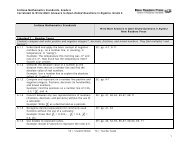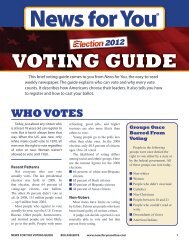IIStrand: Reading Comprehension (Focus on Informational Materials ...
IIStrand: Reading Comprehension (Focus on Informational Materials ...
IIStrand: Reading Comprehension (Focus on Informational Materials ...
Create successful ePaper yourself
Turn your PDF publications into a flip-book with our unique Google optimized e-Paper software.
<str<strong>on</strong>g>Reading</str<strong>on</strong>g> <str<strong>on</strong>g>Comprehensi<strong>on</strong></str<strong>on</strong>g><br />
(<str<strong>on</strong>g>Focus</str<strong>on</strong>g> <strong>on</strong> Informati<strong>on</strong>al <strong>Materials</strong>)<br />
<str<strong>on</strong>g>IIStrand</str<strong>on</strong>g>:<br />
IILESSON 11 Comparis<strong>on</strong> and C<strong>on</strong>trast<br />
STANDARDS:<br />
8.2.1, 10.2.1,<br />
10.2.4<br />
with Informati<strong>on</strong>al Texts<br />
One of the most comm<strong>on</strong> ways of analyzing things is to compare and c<strong>on</strong>trast them. When<br />
you compare, you find similarities between two or more people, places, or things. When<br />
you c<strong>on</strong>trast, you find differences between them.<br />
RULE<br />
When you<br />
compare, you find<br />
ways that two or<br />
more things are<br />
alike. When you<br />
c<strong>on</strong>trast, you find<br />
ways in which they<br />
are different.<br />
EXAMPLE<br />
As you read, compare and c<strong>on</strong>trast the two letters to the editor below.<br />
Dear Editor:<br />
I am writing to commend your newspaper<br />
<strong>on</strong> your excellent media coverage. You<br />
did an outstanding job of covering the<br />
local mayoral electi<strong>on</strong>s. I thought that<br />
your coverage was fair and unbiased.<br />
Furthermore, since I am housebound and<br />
couldnʼt attend the debates, I found it<br />
very helpful that you gave important facts<br />
about the positi<strong>on</strong>s of both candidates.<br />
You truly helped me understand the<br />
issues in a timely fashi<strong>on</strong>—well in time<br />
for me to submit my absentee ballot.<br />
Jill Rhodes, Santa Rosa<br />
Dear Editor:<br />
I have never written a letter to a<br />
newspaper editor before, but then again,<br />
I have never been so outraged before. I<br />
worked <strong>on</strong> Sarah Fordʼs mayoral campaign,<br />
and I never <strong>on</strong>ce saw a reporter from your<br />
newspaper at any of her speeches. Your<br />
slanted coverage seemed to take its “facts”<br />
from the attack ads aired by her opp<strong>on</strong>ent.<br />
Your reporters simply parroted what was<br />
said about Ms. Ford instead of taking the<br />
time to talk to her or her staff.<br />
Your shallow coverage was a disservice<br />
to the electorate. I hope that by the<br />
next electi<strong>on</strong> you will have learned the<br />
importance of talking to both candidates<br />
rather than relying <strong>on</strong> your ridiculous<br />
excuse for journalism.<br />
Tanisha Rogers, S<strong>on</strong>oma<br />
A Venn diagram is a good way to compare and c<strong>on</strong>trast ideas. In the diagram below,<br />
similarities between the two letters are listed in the intersecti<strong>on</strong> of the two ovals.<br />
Differences between the letters are in each oval outside the intersecti<strong>on</strong>.<br />
CAHSEE TIP<br />
Use the reading<br />
strategy of making a<br />
Venn diagram to keep<br />
track of similarities<br />
and differences<br />
between two things.<br />
<br />
<br />
<br />
<br />
<br />
<br />
<br />
<br />
<br />
<br />
<br />
<br />
<br />
<br />
<br />
<br />
<br />
<br />
<br />
<br />
<br />
© New Readers Press. All rights reserved.<br />
44 UNIT II: <str<strong>on</strong>g>Reading</str<strong>on</strong>g> <str<strong>on</strong>g>Comprehensi<strong>on</strong></str<strong>on</strong>g> (<str<strong>on</strong>g>Focus</str<strong>on</strong>g> <strong>on</strong> Informati<strong>on</strong>al <strong>Materials</strong>)
Guided Practice<br />
ACTIVE<br />
READING<br />
As you read<br />
the selecti<strong>on</strong>,<br />
underline details<br />
about womenʼs<br />
basketball, and<br />
circle details about<br />
menʼs basketball.<br />
Read the following essay.<br />
If there is <strong>on</strong>e sport that I love, it is basketball. I can watch a professi<strong>on</strong>al game,<br />
a college game, or a pick-up game. Just recently, I’ve become a fan of women’s<br />
basketball. I first started watching it when the Olympics were <strong>on</strong> TV. I enjoyed the<br />
women’s games as much as the men’s.<br />
Unfortunately, I find it hard to enjoy women’s basketball when I watch it <strong>on</strong> TV.<br />
That’s because my brother c<strong>on</strong>tinually harasses me. He yells, “They couldn’t even<br />
beat the high-school boys’ team down the street!” When I get over being angry, I<br />
try to talk rati<strong>on</strong>ally with him. I agree that the men are larger and str<strong>on</strong>ger than the<br />
women and that the men’s sheer athleticism far outdistances the women’s. And I<br />
can’t disagree that the men’s teams have more fans and therefore bring in more<br />
revenue than the women’s teams do.<br />
However, I disagree with my brother <strong>on</strong> a couple of other issues. For example,<br />
both men and women can handle the ball well and make the right decisi<strong>on</strong>s, and<br />
both men and women are fiercely competitive. Maybe if I give it some time, even<br />
my hardheaded brother will come around to the fact that women’s basketball is<br />
worth watching. Who knows He may even become a fan, like me.<br />
On a separate piece of paper, compare and c<strong>on</strong>trast men’s and women’s basketball by<br />
drawing a Venn diagram like the <strong>on</strong>e <strong>on</strong> page 44. Then, answer questi<strong>on</strong>s 1 and 2.<br />
1. According to the selecti<strong>on</strong>, what is ONE<br />
similarity between menʼs and womenʼs<br />
basketball<br />
THINK: How are the two the same<br />
2. According to the selecti<strong>on</strong>, what is<br />
ONE dissimilarity between menʼs<br />
and womenʼs basketball<br />
THINK: How are the two different<br />
A<br />
types of fans<br />
A<br />
number of fans<br />
B<br />
advertising dollars generated<br />
B<br />
ages of the players<br />
C<br />
competitiveness of the players<br />
C<br />
know-how of the players<br />
D<br />
size and strength of the players<br />
D<br />
coverage in the Olympics<br />
3. Women professi<strong>on</strong>al athletes are paid far less than men. Is this fair<br />
Use the chart below to organize your ideas. Then, write a 1- to 2-paragraph resp<strong>on</strong>se<br />
<strong>on</strong> another piece of paper.<br />
© New Readers Press. All rights reserved.<br />
Step 1 Take a positi<strong>on</strong>.<br />
Step 2 Give a reas<strong>on</strong>. You can use<br />
informati<strong>on</strong> from the selecti<strong>on</strong>.<br />
Step 3 Write TWO facts from the<br />
selecti<strong>on</strong> to support your<br />
opini<strong>on</strong>.<br />
I think that it (is/is not) fair that women<br />
professi<strong>on</strong>al athletes make less m<strong>on</strong>ey than<br />
men who play the same sport.<br />
UNIT II: <str<strong>on</strong>g>Reading</str<strong>on</strong>g> <str<strong>on</strong>g>Comprehensi<strong>on</strong></str<strong>on</strong>g> (<str<strong>on</strong>g>Focus</str<strong>on</strong>g> <strong>on</strong> Informati<strong>on</strong>al <strong>Materials</strong>)<br />
45
II<br />
II<br />
PRE-READING:<br />
Strand: <str<strong>on</strong>g>Reading</str<strong>on</strong>g> <str<strong>on</strong>g>Comprehensi<strong>on</strong></str<strong>on</strong>g><br />
(<str<strong>on</strong>g>Focus</str<strong>on</strong>g> <strong>on</strong> Informati<strong>on</strong>al <strong>Materials</strong>)<br />
CAHSEE Practice<br />
Read the following selecti<strong>on</strong> and answer questi<strong>on</strong>s 1 through 4.<br />
This selecti<strong>on</strong> is about two important leaders in the struggle against<br />
slavery in the United States—Abraham Lincoln and Frederick Douglass. Before you read,<br />
write down <strong>on</strong>e fact that you know about slavery.<br />
CAHSEE TIP<br />
As you read a<br />
comparis<strong>on</strong> and<br />
c<strong>on</strong>trast piece, think<br />
about what you read.<br />
In this case, think<br />
about how these<br />
two very different<br />
men were similar in<br />
important ways.<br />
Lincoln and Douglass:<br />
Two Men for Their Times<br />
When we think of the struggle to end slavery in<br />
the United States, we often think of two men<br />
who were key figures in that struggle—<br />
Abraham Lincoln and Frederick Douglass.<br />
Abraham Lincoln was the sixteenth president of<br />
the United States, serving in office from 1861 to<br />
1865. Frederick Douglass was a major<br />
spokespers<strong>on</strong> for the aboliti<strong>on</strong>ists, activists who<br />
worked to end slavery in the United States<br />
during the decades prior to the Civil War.<br />
Most people are unaware that there are some<br />
interesting similarities between these two men.<br />
Both were born into very poor families:<br />
Lincoln, to poor farmers; Douglass, to enslaved<br />
people. Both men were also self-educated.<br />
Lincolnʼs family could not afford to allow him<br />
to spend much time in school; Douglass, as the<br />
s<strong>on</strong> of enslaved people, did not receive a formal<br />
educati<strong>on</strong>. Both men lost their mothers when<br />
they were young, and both men spent their early<br />
adulthoods <strong>on</strong> farms. Both men then moved<br />
from border slave states to free states. (Lincoln,<br />
from Kentucky to Indiana; Douglass, from<br />
Maryland to Massachusetts and New York.)<br />
At an early age, Douglass was taught to read by<br />
his ownerʼs wife, Mrs. Auld. As a Northerner<br />
who had moved to the South, she did not know<br />
about the restricti<strong>on</strong>s against teaching enslaved<br />
people to read and write. Once Douglass<br />
became literate, he devoted himself to<br />
developing the reading and writing skills that<br />
would serve him for the rest of his life. Lincoln<br />
attended school, in his words, “by littles”—here<br />
and there, for <strong>on</strong>ly a few weeks at a time. All<br />
told, he did not have more than a year of formal<br />
educati<strong>on</strong>. However, he had a voracious thirst<br />
for knowledge, and he helped quench that thirst<br />
by reading the Bible and such books as Aesopʼs<br />
Fables and the Life of Washingt<strong>on</strong>, which he<br />
walked l<strong>on</strong>g distances to borrow.<br />
Both men used their c<strong>on</strong>siderable natural<br />
abilities with language to work against slavery.<br />
Lincolnʼs most famous speech, the Gettysburg<br />
Address, stands as <strong>on</strong>e of the most memorable<br />
oratories in American history. Douglassʼs<br />
speeches against slavery; his autobiography The<br />
Narrative of the Life of Frederick Douglass, an<br />
American Slave; and the work he did as editor<br />
© New Readers Press. All rights reserved.<br />
46 UNIT II: <str<strong>on</strong>g>Reading</str<strong>on</strong>g> <str<strong>on</strong>g>Comprehensi<strong>on</strong></str<strong>on</strong>g> (<str<strong>on</strong>g>Focus</str<strong>on</strong>g> <strong>on</strong> Informati<strong>on</strong>al <strong>Materials</strong>)
of the North Star, a leading aboliti<strong>on</strong>ist<br />
newspaper, were major weap<strong>on</strong>s in the<br />
movement to educate Americans about the evils<br />
of slavery.<br />
Of course, there were also profound differences<br />
between the two men. Lincoln was born a free<br />
man; Douglass was not. After years of<br />
unsuccessfully trying to buy his freedom,<br />
Douglass finally gained it by borrowing the<br />
papers of a freed black sailor and<br />
impers<strong>on</strong>ating him.<br />
people in C<strong>on</strong>federate states. Douglass, as a<br />
newspaper publisher, did not have the same<br />
direct power to end slavery that Lincoln had,<br />
but his speeches, his autobiography, and the<br />
anti-slavery articles he published had a<br />
powerful impact <strong>on</strong> public opini<strong>on</strong>.<br />
One of the most profound differences between<br />
the two men was their positi<strong>on</strong> <strong>on</strong> slavery.<br />
Douglass was an aboliti<strong>on</strong>ist; Lincoln was not.<br />
Lincoln opposed the expansi<strong>on</strong> of slavery, not<br />
its existence.<br />
Lincoln, as president of the United States, used<br />
the war powers of his office to free enslaved<br />
Lincoln died from an assassinʼs bullet at age 56.<br />
Douglass died of natural causes at age 77.<br />
Multiple-Choice<br />
1. According to paragraph 3 of the<br />
selecti<strong>on</strong>, Lincoln had a “voracious<br />
thirst for knowledge.” In this c<strong>on</strong>text,<br />
voracious means the same as—<br />
A<br />
B<br />
C<br />
D<br />
eager.<br />
ordinary.<br />
idealistic.<br />
apathetic.<br />
3. According to the selecti<strong>on</strong>, in which of<br />
the following ways were Lincoln and<br />
Douglass SIMILAR<br />
A<br />
B<br />
C<br />
D<br />
Both were politicians.<br />
Both were aboliti<strong>on</strong>ists.<br />
Both were self-educated.<br />
Both died of natural causes.<br />
© New Readers Press. All rights reserved.<br />
2. Based <strong>on</strong> details in the selecti<strong>on</strong>, with<br />
which of the following statements would<br />
Frederick Douglass MOST likely agree<br />
A<br />
B<br />
C<br />
D<br />
Work for gradual change.<br />
Success comes to the lucky.<br />
There is no freedom without struggle.<br />
Take care of your own problems, and<br />
d<strong>on</strong>ʼt worry about other peopleʼs.<br />
4. According to the selecti<strong>on</strong>, which of the<br />
following was a major DIFFERENCE<br />
between Lincoln and Douglass<br />
A<br />
B<br />
C<br />
D<br />
Douglass was an orator; Lincoln<br />
was not.<br />
Douglass was an aboliti<strong>on</strong>ist; Lincoln<br />
was not.<br />
Douglass was born poor; Lincolnʼs<br />
family was wealthy.<br />
Douglass was born in a border slave<br />
state; Lincoln was born in a free state.<br />
UNIT II: <str<strong>on</strong>g>Reading</str<strong>on</strong>g> <str<strong>on</strong>g>Comprehensi<strong>on</strong></str<strong>on</strong>g> (<str<strong>on</strong>g>Focus</str<strong>on</strong>g> <strong>on</strong> Informati<strong>on</strong>al <strong>Materials</strong>)<br />
47
1CAHSEE<br />
1<br />
Practice Test<br />
51. By saying “You may think family farms are<br />
rapidly going the way of the woolly mammoth<br />
and the dodo,” the author means that such<br />
farms are—<br />
A<br />
B<br />
C<br />
D<br />
difficult to maintain and keep healthy.<br />
unsuccessful because they raise <strong>on</strong>ly unusual<br />
animals.<br />
unable to survive because of changes in<br />
climate.<br />
almost g<strong>on</strong>e.<br />
A B C D<br />
54. Which quotati<strong>on</strong> from the selecti<strong>on</strong> shows that<br />
the author sees farming as a business<br />
A<br />
B<br />
C<br />
D<br />
“ Iʼm the <strong>on</strong>e who has really gotten excited<br />
about farming.”<br />
“ Instead of using commercial fertilizers<br />
and pesticides, she manages the soil so<br />
the plants are str<strong>on</strong>g enough to fight off<br />
disease.”<br />
“The luck came in when they got their land.”<br />
“ I hope to gain skills and knowledge that<br />
will add value to their enterprise.”<br />
A B C D<br />
52. Which statement from the essay supports the<br />
authorʼs claim that intelligence is needed to<br />
make a small farm successful<br />
A<br />
B<br />
C<br />
D<br />
“Rick and Emma work hard.”<br />
“ Uncle Rick can fix just about any<br />
machine.”<br />
“I also like selling what I produce.”<br />
“Iʼve worked the fields in the cold rain.”<br />
A B C D<br />
55. Which statement would the author MOST<br />
likely agree with<br />
A<br />
B<br />
C<br />
D<br />
Organic farms are the <strong>on</strong>ly kind that make<br />
m<strong>on</strong>ey.<br />
Farming is best d<strong>on</strong>e <strong>on</strong> a big scale.<br />
A small farm is a great place to work.<br />
Any<strong>on</strong>e can do farm work.<br />
A B C D<br />
53. Read this sentence from the passage.<br />
Her vegetables are always c<strong>on</strong>sidered way<br />
cool at farmers’ markets and restaurants.<br />
Which revisi<strong>on</strong> would improve the underlined<br />
part of the sentence<br />
A<br />
B<br />
C<br />
D<br />
have always got the goods<br />
are always in demand<br />
have always been sold<br />
are always kept refrigerated<br />
A B C D<br />
56. Which revisi<strong>on</strong> would improve the underlined<br />
part of the sentence in the last paragraph of<br />
the essay<br />
A<br />
B<br />
C<br />
D<br />
they are smart enough to raise crops<br />
theyʼve got the smarts to grow stuff<br />
they know they cannot grow crops<br />
theyʼve used their minds to grow food<br />
A B C D<br />
© New Readers Press. All rights reserved.<br />
192 CAHSEE English–Language Arts Practice Test 1


